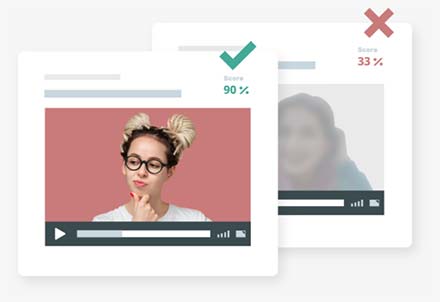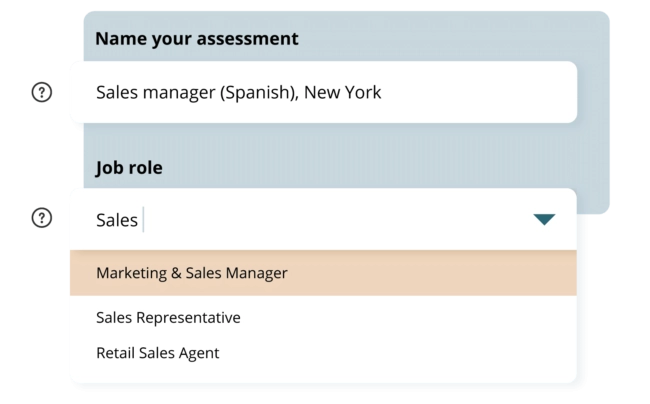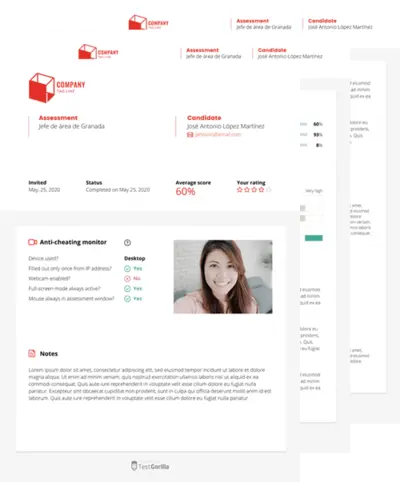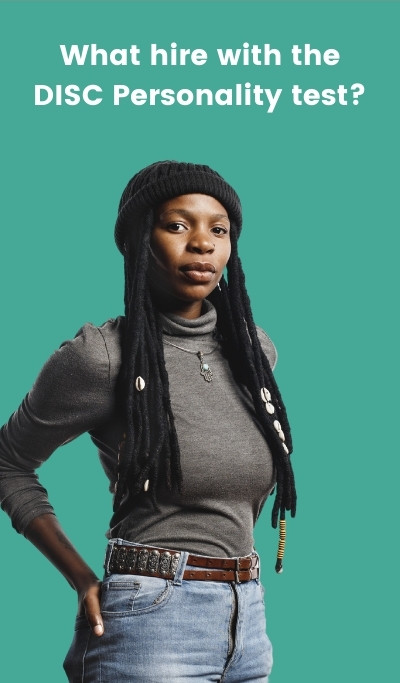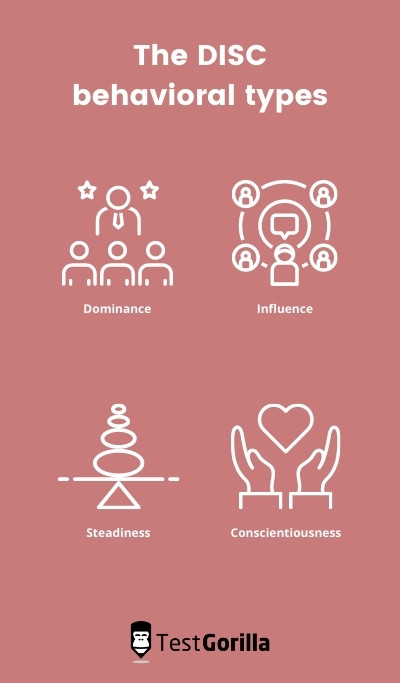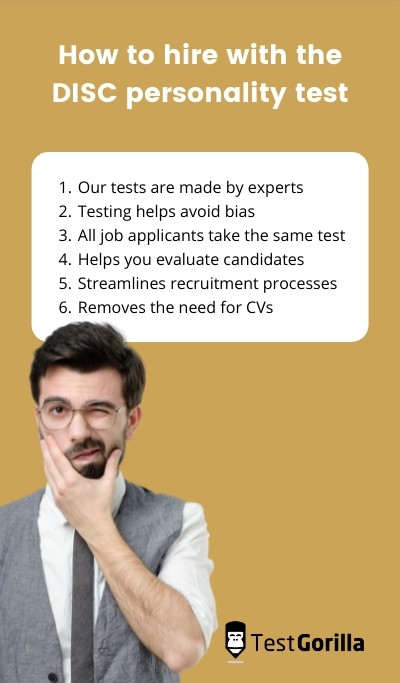DISC personality test: Pre-employment screening assessment to hire the best candidates
Summary of the DISC test
The DISC test is based on the model developed by psychologist William Marston for behavioral assessment. It classifies how we express emotions into the four behavior types of DISC: dominance (D), influence (I), steadiness (S), and conscientiousness (C).
Use the DISC test to hire
Any job role. This test can help you understand each of your candidates (as well as current team members) better and build effective ways to collaborate and communicate as a team.
Type
Time
Languages
Level
About the DISC test
Understanding which behavior type motivates you and others to take action and make decisions enables you to navigate relationships, collaborations, and conversations with others better. Once you understand that main trait that governs your and others’ behavior you can tailor your words and actions and guide those of others to achieve better results together.
The DISC test offers these insights for your candidates by asking them to conduct a self-evaluation by scoring each of 48 statements from 1 (very inaccurate) to 5 (very accurate). The way candidates score these statements shows their preferences for each type of behavior in the DISC model: dominance (D), influence (I), steadiness (S), and conscientiousness (C). Candidates can sit squarely within one of the four main behavioral types or exhibit a combination between one type and one of its two adjacent ones, giving a total for 12 possible outcomes.
The results page gives the type of each candidate and a general description of their behavioral type. It then gives provides insights into how each type behaves in their personal relationships and at work and describes their best traits and main challenges. Finally, the report offers tips for effectively communicating and working with that type, as well as suggested questions to use in an interview.
The test is made by a subject-matter expert
Margarida R.
Margarida is a clinical psychologist and psychometrist. Her work has focused on studying and conducting psychological evaluations on different populations across a variety of clinical settings, from pain clinics and hospitals in Chicago to state prisons in Los Angeles. Two years ago, Margarida opened her own private practice in her hometown of Lisbon, Portugal, where she now dedicates her time to developing new psychological tests, conducting research, and doing therapy in person and online.
Crafted with expert knowledge
TestGorilla’s tests are created by subject matter experts. We assess potential subject-matter experts based on their knowledge, ability, and reputation. Before being published, each test is peer-reviewed by another expert, then calibrated using hundreds of test takers with relevant experience in the subject. Our feedback mechanisms and unique algorithms allow our subject-matter experts to constantly improve their tests.
What our customers are saying
TestGorilla helps me to assess engineers rapidly. Creating assessments for different positions is easy due to pre-existing templates. You can create an assessment in less than 2 minutes. The interface is intuitive and it’s easy to visualize results per assessment.
David Felipe C.
VP of Engineering, Mid-Market (51-1000 emp.)

Any tool can have functions—bells and whistles. Not every tool comes armed with staff passionate about making the user experience positive.
The TestGorilla team only offers useful insights to user challenges, they engage in conversation.
For instance, I recently asked a question about a Python test I intended to implement. Instead of receiving “oh, that test would work perfectly for your solution,” or, “at this time we’re thinking about implementing a solution that may or may not…” I received a direct and straightforward answer with additional thoughts to help shape the solution.
I hope that TestGorilla realizes the value proposition in their work is not only the platform but the type of support that’s provided.
For a bit of context—I am a diversity recruiter trying to create a platform that removes bias from the hiring process and encourages the discovery of new and unseen talent.
David B.
Chief Talent Connector, Small-Business (50 or fewer emp.)

Use TestGorilla to hire the best faster, easier and bias-free
Our screening tests identify the best candidates and make your hiring decisions faster, easier, and bias-free.
Watch what TestGorilla can do for you
Create high-quality assessments, fast
Building assessments is a breeze with TestGorilla. Get started with these simple steps.
View a sample report
The DISC test will be included in a PDF report along with the other tests from your assessment. You can easily download and share this report with colleagues and candidates.
What is the DISC Personality test?
The DISC Personality test can help you understand candidates’ behavior and how they are likely to interact and communicate with others while on the job. It is based on the DISC theory, which was developed by a psychologist named William Marston back in 1928.
The test is a behavioral assessment that classifies how people express emotions into four behavior types:
• Dominance (D)• Influence (I)• Steadiness (S)• Conscientiousness (C)
You can use the DISC Personality test for a wide range of open roles in your organization – candidates for any position can take the test.
This personality test will give you insight into how candidates communicate with their managers and other employees, collaborate with their team members, and approach conflict. It can also give you an idea of their current leadership capabilities.
On top of that, the DISC Personality test can help your candidates understand themselves better, including their strengths and what they need to work on.
How the DISC Personality test works
The test is a self-assessment in which candidates are asked a series of 48 questions in the form of statements. The applicants must read each statement and respond by selecting a number from one to five on a Likert scale, with one meaning “very inaccurate” and five meaning “very accurate.”
The way the candidates respond to the questions will determine their DISC profiles. The accuracy of the DISC Personality test’s results depends on the applicants’ honesty when answering. Candidates’ personality types are represented by either a single one of the four behavior traits (Dominance, Influence, Steadiness, and Conscientiousness) or by two of these traits. There are a total of 12 possible personality combinations.
The results page provides detailed descriptions of each of the types, including their top strengths and their main weaknesses and challenges.
Here are the 12 DISC personality combinations
• D: Candidates who receive a D in their DISC Personality test prefer more independence, want to be in control of situations, and are determined and resourceful. Challenges they may face include being impatient and reacting negatively when others try to limit their authority or autonomy. The best roles for D candidates are positions that involve operations management or entrepreneurial activities, especially C-level roles.
• DC: These types are highly independent, pursue personal accomplishments and are focused on results. They can find it challenging to be flexible and to take other people’s emotions into account. The best role for a DC candidate would be a project manager or a product manager.
• DI: Candidates with the DI type are usually assertive and decisive. They’re adept at convincing others to work toward a common goal. They can struggle with trying to exert too much control over situations and pursuing too many ideas at once. DI candidates are most suited to roles such as recruiters or sales representatives.
• I: Those with the I type are usually open and easy to approach, and enjoy spending time with others. They can sometimes find it difficult to limit the time they spend with other people and to plan ahead. I types are best in roles such as designers, copywriters, and creative directors.
• ID: Applicants with the ID type are energetic and adventurous. They focus on the big picture and tend to speak in a casual way. It can be challenging for them to follow a set routine, and they can fail to properly manage risk because of their optimistic outlook. The top roles for those with this personality type are marketing managers and public-relations managers.
• IS: Candidates with this type approach others with an open and trustworthy attitude. They are accommodating and may struggle with conflict avoidance and with being assertive. The best roles for IS types are trainers and customer-support representatives.
• S: S types listen patiently to others and respectfully consider team members’ thoughts and feelings. Their supportiveness is often helpful in stressful situations. This type can be too passive and not direct enough when delivering negative information. S candidates fit well into roles such as human-resource managers and customer-success specialists.
• SI: Candidates who are SI types show care and understanding when listening to others. They are considerate and want to create a warm atmosphere for others to feel secure. Those with this type can find it challenging to detach themselves from a situation and may react emotionally instead of objectively. SI types often make great executive assistants and customer-support representatives.
• SC: Those with the SC type are quick to agree with others and are extremely perceptive and detail-oriented. They can struggle with avoiding conflict and putting off risky decisions. The best roles for the SC type are accountants and editors.
• C: Applicants who are C types are objective, skeptical, and logical in their approach to tasks. Their pragmatic attitude helps them solve problems. It can be challenging for them to overcome their perfectionism and their need to double-check everything before making a decision. The best roles for this personality type are software engineers and systems administrators.
• CD: CD types are skeptics who like having autonomy and control over whom they work with, when they work, and what they work on. They emphasize efficiency, accuracy, and logic. Sometimes, they can be overly critical, resist compromising their standards for the sake of efficiency and want to do things alone, even in situations when they need to develop relationships. The roles that best fit CD types are data scientists and architects.
• CS: Candidates who are CS types are serious and rational, and they enjoy sound logical argumentation. They are systematic and methodical in their approach. At times, they can be overly cautious and overcomplicate situations. The top roles for those with the CS type are data scientists and financial analysts.
How the DISC Personality test can help you hire the right candidate
Compared with CV screening, pre-employment tests like the DISC Personality test reduce bias by allowing all of your candidates to showcase their skills. The results you receive will be objective because all of the job applicants will complete the same test.
In addition, you will receive each candidate’s personality type, as well as a general description of their behavioral type. The results of the DISC Personality test will help you gain a deeper understanding of each applicant and how their personality would fit in with their prospective team.
Pre-employment assessments also streamlines your recruitment process by removing the time it takes to sift through CVs and helps you focus on the top test performers. By testing job applicants you can focus on the best candidates and compare them objectively through test results.
In summary
When you’re hiring for an open role in your business, you are looking for a candidate who has more than just the right technical skills. You also want to find someone who represents a strong culture add and whose values align with those of your organization.
That’s why the first step in finding the right person for the role is giving applicants the DISC Personality test to find out more about their behavior on the job.




